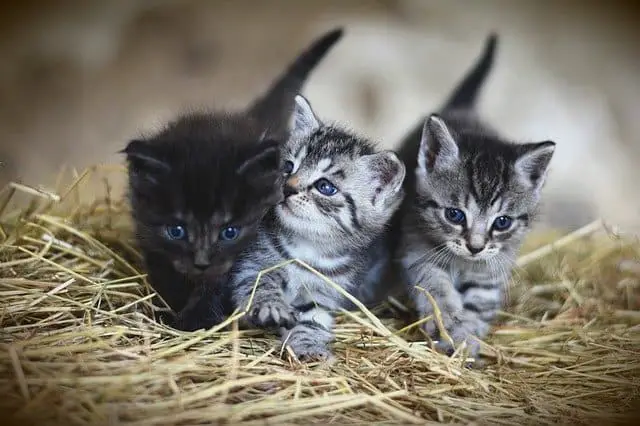
The cats a month requires many care because highly dependent on their mother or their caregivers because they can not fend for themselves at that age can barely walk properly.
However, they do not know how to eat or drink alone, so below we will explain everything you need to know about them, so that if you are in the situation of taking care of a one-month-old kitten, you know how to act in these cases. Let’s go there.
First care of one month old cats
Ideally, a baby cat should always be close to its mother for as long as possible, since she will be the one who takes care of it correctly, especially in the first weeks of life.
The mother is the one who will give the puppy colostrum, this is the most important food in the first month of life of the little feline .
Colostrum must be consumed by the puppy in its first 24 or 72 hours of life, it gives many benefits to the little one.
Among these are antibodies and antimicrobial factors that will help the puppy to have well-boosted defenses, mainly in the intestines.
It is very common to find litters of cats of a month or less, abandoned in the streets, either by those who should have been their caretakers or by the mother herself.
When that happens, the fate of these little ones is in our hands, because now they will depend completely on our care and what we can do for them.
Provide food that is moist. Although the kittens have their milk teeth one month after they are born , they are still growing.
Therefore, they should only eat foods that are soft. If the food is naturally large, you should chop or grind it well, so that it is easy for them to eat it.
You should give a one-month-old kitten water. You may not want to drink it at first, however, it is vital that you adapt to it.
That is why you can resort to putting a little water in their food, in this way the little one will adapt.
You should have a safe, warm, and very comfortable place to rest. In general, one-month-old cats can sleep up to 20 hours a day.
Therefore, the ideal is that your bed is in an area of the house where there are no drafts, it is quiet.
How to raise month-old cats Advice
At this age, in addition to requiring food and water, cats will demand a lot of pampering and constant company to play, or simply not to feel alone.
It is very important that, during this stage of the feline, you spend most of the time with it, the ideal is that we can hold it for a while, caress it and play with your kitten.
In this way, a bond is created with the feline and it also adapts to this type of affection.
When they are one month old, the cubs cannot run too long. However, at that time, it is when its paws begin to gain strength and in this way he can begin to learn to lead a playful puppy life.
If the one-month-old has found it or they have given it to you, it is recommended that you take it to the vet that same day.
In this way, you can ensure that the little one is in good health and you can receive some advice from the doctor.
If it was a stray, it is very normal for it to have parasites, most of them, transmitted by its own mother.
When a baby cat has not been dewormed, you will know immediately, as it will eat desperately and abundantly. Also, your belly will be very big and swollen.
Then it will be the turn to create a vaccination schedule, the same veterinarian will tell you what is the right time to start this process.
Once dewormed and vaccinated, the puppies can begin to have a normal feline life.
However, remember that knowing how to care for a one-month-old cat requires time and effort, so by adopting it, you will be assuming a responsibility .
If you feel that you have difficulties regarding the behaviour of the little one, its health and if it is healthy, visit a veterinarian, he will be able to solve all your doubts and give you the best advice.
Basic needs
- Food
- Water
- Visit to the vet (deworming and tests)
- Comfortable and warm place to sleep
- Space to play and explore
- Toys
- Attention, pampering and love
- Special items for puppy baths
Feeding cats their first month
The first thing you need to know when feeding a one-month-old cat is that you cannot give them cow’s milk, soy or rice. There are special formulas for feeding puppy cats.
When you go to heat the formula, do not do it directly, first, heat a pot with water and then put the bottle with milk there. Leave it for a few seconds and test the heat of the formula on your wrist, so you will know if it is warm or if it lacks a little more heat.
When feeding the feline, do not place it on its back, that is, on its back; Ideally, you should leave it face down and raise its head a little .
To get your little one to accept the bottle, gently rub it from one side to the other over their mouth and on their gums. In this way, the little one will be encouraged to take it and will begin to drink little by little.
Remember that you must tilt the bottle up, so there are no air spaces in the bottle.
Once the third feeding round is over, offer it some water to hydrate and start accepting.
You should not force them to eat or make them take the formula too quickly, you have to be patient.
Felines that take formula will need to burp to remove gas, this can be done by placing the puppy face down on your legs or in your arms and gently rubbing its back .
How many times does a one-month-old cat eat?
Remember that baby cats, if they are less than 15 days old, should eat every 3 hours, including night time hours.
In the case of those who are between 15 days and 1 month old, they should eat every 4 or 5 hours . And when these are already past the month, up to 2 months, the ideal is that they eat every 6 hours .
Once the little one has reached one month old, they can be added wet foods to its diet , so that he can stop taking only formula.
How to train a one-month-old cat?
To train a kitten correctly, you must be affectionate but assertive. That is, teach them with love and patience, but with a little authority, so that the little one knows that you are the one who guides them.
Never hit them, yell at them or treat it too harshly, it scares them and creates trauma and insecurities. In the wild, the mother of the felines educates them until they are around three months old.
From the moment the child arrives home, the ideal is to give it a name and start calling them for it from that moment. So that it adapts to it and learns little by little to heed the call of its kitten name .
When the little one does something correctly, heeds your call or some order, the right thing to do is encourage and congratulate it. Give it pampering, play with it and talk sweetly to it, so the puppy will know that he has done it is okay and for that it receives a reward.
If the little cat bites you and usually does it when you try to touch it, caress it or even when you are close, it is recommended that this behaviour be corrected early.
To do this, you must get serious, look it in the eyes and in a resounding way, but without shouting, say a strong NO! In this way, the little one will understand that what it has done is wrong and is not acceptable.
For the kitten to get used to using its litter box, it is recommended that as soon as it gets home or when it begins to walk, it is taken to it, even for a few seconds, so little by little he gets used to its texture.
Although the vast majority of cats use a sandbox for the first time without problems and almost instinctively, when seeing the sand, in some cases, you will have to arm yourself with patience to be able to teach the feline to relieve itself in the sandbox.
When it does it outside of it, immediately take it in your arms and take it to the sandbox.
If possible, take some of their urine and feces and place them there, so that the smell tells them that this is where it is done.
How much does a cat sleep its first month?
The cats when they are babies can get plenty of sleep, from birth until they are about 5 or 6 months. These little ones can sleep up to 20 hours a day.
As they grow older, these cats reduce their sleep hours a bit, as they begin to want to play and explore the world around them.
However, you will notice that they spend more time sleeping than awake. Well, while they sleep, their body develops and they also recover the energy they use.
My one month old cat does not poop, what is wrong with it?
The digestive system of cats one month old or less is different from that of older cats, which is why the mother is the one who constantly encourages them to relieve themselves.
In general, cats lick the tummy, anus and genitals of puppies to stimulate them to relieve themselves. Well, they do not learn to do it by themselves until about a month old, which is when they begin to give more solid food.
In the event that your little one cannot poop, take a clean cloth and moisten it in warm water, with this, gently rub his tummy making slow and loving circles.
In the same way, you can also take a sterile cotton or gauze and soak it also in warm water, pass it very gently in a circular way over its anus and genitals. This will encourage it to relieve themselves.
In case this does not work and you feel that your little one is constipated, take the tip of a sprig of parsley (that is well washed) and fill it with olive oil or paraffin.
Introduce it a little in the rectum of the feline giving small circles, this will immediately stimulate the little one to poop. Always check with your vet first.
How to bathe a 1-month-old cat?
The first thing we will say is that cats do not bathe. Only when they come home from the street, for the first time, dirty and occasionally, when it has become dirty, for some specific reason.
- Use a bathtub or baby tub, on the floor of it, place a mat or rubber mat to prevent the cat from slipping.
- Fill the bathtub with lukewarm water. Make sure you do this by calculating that the little one can stand upright without sinking.
- Place the special puppy shampoo, a container to add water to and remove the shampoo from its fur, and two fluffy towels at your fingertips.
- Take the little feline and gently introduce it into the water. Pet it and put water on its fur, this way it will feel more secure. Do not let shampoo or water get on its head, as this will prevent it from getting into his ears, nose and mouth.
- Apply the shampoo according to the instructions on the container and then rinse carefully.
- Once ready, take it out of the water and take one of the towels to wrap it and start rubbing it gently , so you can dry its fur. Use the second towel to finish drying it.
- In case the little one has a long coat, you should use a hairdryer and a brush. Do not use the dryer too close to the little one and make sure it is on “cold”, as the hot air could burn their delicate skin. Brush their fur until it is completely dry.
- Finally, check that the water does not show the presence of external parasites. In the event that you notice some, consult your veterinarian to find out how to eliminate them.
Before adopting a one-month-old cat. Liability tips

- The first thing to remember, especially if they are so young, is that cats need constant care , the first months of life.
- You must have a home where you can create special spaces for the feline, play places, where its feeder and drinker are, its sandbox area and a resting place, where he can sleep, relax and groom themselves.
- You should have the number and address of a veterinarian handy, since month-old cats sometimes need to be cared for by a professional doctor.
- Remember that puppy cats are very energetic when they are awake, so you should take time to take care of them and ensure that they do not get into trouble or hurt themselves.
- You will have to dedicate part of your time to educate your feline . In addition to this, you must arm yourself with patience, because educating them is not always an easy task.
- Finally, you must remember that adopting a puppy implies that it will progressively grow into an adult. If you do not want your feline to have babies, shell or sterilize it, thus you will avoid this inconvenience and possible diseases. In addition to that, remember that cats can live between 12 and 18 years on average, so it will be a responsibility for that time.
If you liked this post and you learned how to take care of a one-month-old cat, share it so that more people know everything about these feline puppies.
You can also leave us your comments telling us about your experience raising a small feline.






